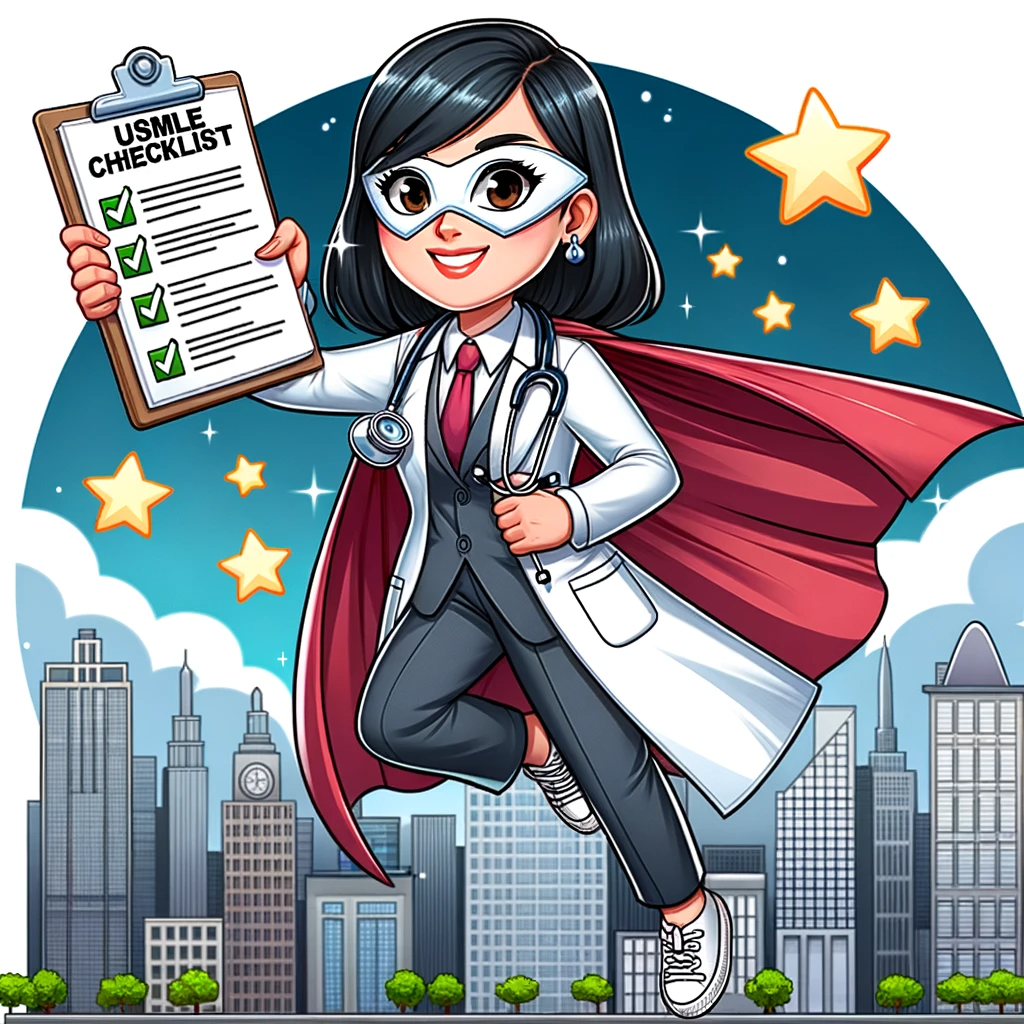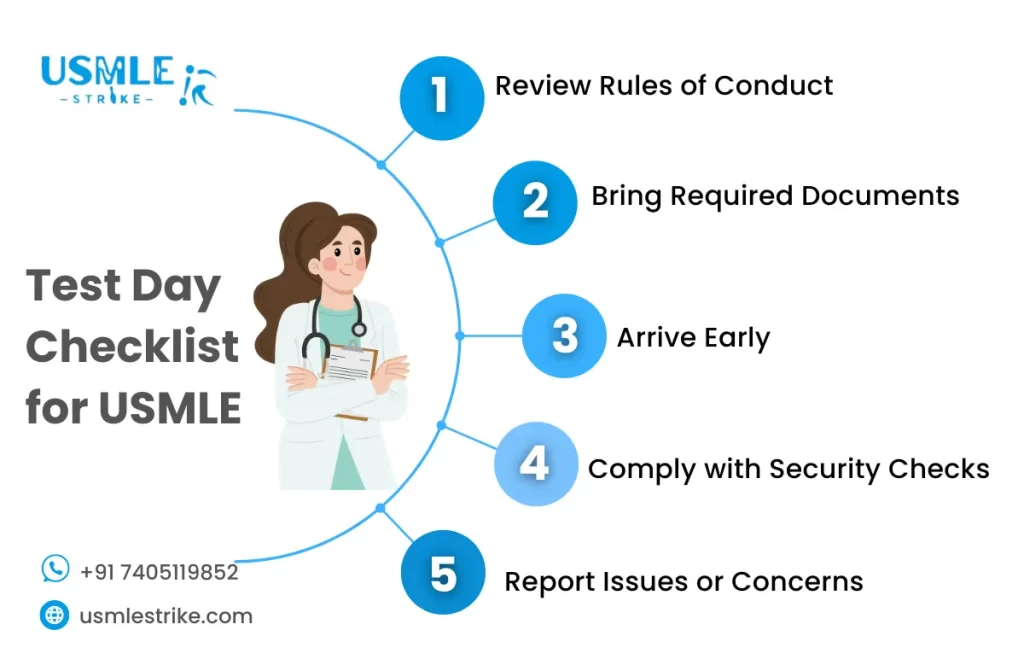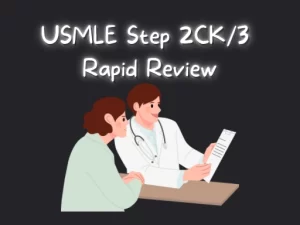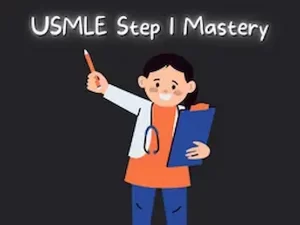
Embarking on the journey to medical licensure through the United States Medical Licensing Examination (USMLE) can be daunting. But fear not! Our ultimate USMLE checklist breaks down everything you need to know and do, from registration to test day, ensuring a seamless experience. Let’s set you up for success!
USMLE Checklist: Test Day
Essential Documents: Your Entry Pass to the Exam
Your ability to take the exam hinges on crucial documents. Missing any of these can mean turning back home. Ensure you have your Examination Permit, which is your essential ticket for the test. This permit is your official authorization to sit for the USMLE exam and includes details such as your exam date, time, and location. Additionally, bring your Government-Issued Photo ID for verification of your identity. This ID must be unexpired and contain your full name exactly as it appears on your permit.
ID should be a valid government-issued photo identification such as a passport or driver’s license. It serves as a primary means of confirming your identity and eligibility to take the exam. Alongside your photo ID, bring your Medical School ID as another layer of verification. The USMLE Checklist should be followed meticulously to avoid any setbacks on exam day. This ID confirms your affiliation with an accredited medical school and provides further validation of your eligibility for the exam. Double-check these documents before leaving for the test center to ensure a smooth entry process.
Personal Items: Enhancing Comfort and Focus
Your personal items can improve comfort and maintain performance during the test. Consider bringing snacks like fruits or nuts for sustained energy. Healthy snacks can help regulate your blood sugar levels and provide a steady source of energy throughout the exam. Additionally, a water bottle is essential to stay hydrated without excessive breaks. Dehydration can lead to fatigue and decreased cognitive function, so it’s crucial to maintain proper hydration during the exam.
A wristwatch is another valuable item to bring as it helps track time effectively, especially under stress. Monitoring your time allows you to pace yourself and allocate sufficient time to each section of the exam. Choose items that aid without causing distraction, ensuring they comply with the test center’s guidelines regarding permissible items. Following the USMLE Checklist for personal items ensures a comfortable and focused exam experience.

Dressing for Success: Prioritizing Comfort
Your attire impacts comfort and concentration during the exam. Opt for layered clothing that’s adaptable to fluctuating temperatures. USMLE Checklist for comfort is essential for an uninterrupted exam experience. Test centers may vary in temperature, so wearing layers allows you to adjust accordingly for optimal comfort. Comfortable footwear is also vital for long hours of focus. Choose shoes that provide adequate support and cushioning to prevent discomfort or distractions during the exam. Avoid clothing or footwear that restricts movement or causes discomfort, as it can hinder your ability to concentrate effectively. Dressing comfortably contributes significantly to sustained performance throughout the exam.
Stationery Supplies: Traditional Tools for Efficiency
Although the exam is digital, traditional stationery can be helpful for notes or calculations. Bring a whiteboard and markers for rough work, along with scratch paper for quick notes or calculations. While digital tools are provided during the exam, having these traditional supplies can be beneficial for jotting down ideas, organizing information, or working through complex problems. Familiarize yourself with the test center’s policies regarding the use of these supplies to ensure compliance with their guidelines. Even in a digital age, these tools can enhance your efficiency and effectiveness during the exam. Including traditional stationery as per the USMLE Checklist ensures preparedness for all exam scenarios.
Mental Preparation: Cultivating a Positive Mindset
Your mindset is as crucial as your knowledge when approaching the exam. Prepare mentally by practicing visualization techniques. Take a few moments before the exam to visualize yourself succeeding and performing well. Engaging in positive visualization can elevate your confidence levels and alleviate feelings of anxiety. Deep breathing exercises are also effective in reducing stress and improving focus. Practice deep breathing techniques to calm your mind and enhance concentration during the exam. A strong and positive mindset is key to approaching the exam with confidence and clarity, leading to improved performance.
Know the Test Center Rules: Stay Informed, Stay Confident
Understanding the rules and regulations of the test center is essential for a smooth and confident exam experience. Be aware of the recommended arrival time, which is typically at least 30 minutes before the scheduled start time. Arriving early allows you to complete check-in procedures without rushing and ensures you’re prepared for the exam. Familiarize yourself with the test center’s policies regarding electronic devices, as most centers prohibit the use of electronic devices, including smartphones, during the exam. Staying informed about test center rules is a critical part of the USMLE Checklist for a stress-free exam day.
Last-Minute Revision: Smart Review Strategies
As the exam day approaches, focus on strategic revision strategies to reinforce your knowledge and readiness. Concentrate on reviewing your weak points and areas needing improvement. Identify topics or concepts where you may have gaps in understanding and allocate additional study time to strengthen those areas. Review quick notes or flashcards for rapid recall of key information. Avoid diving into new material right before the exam, as this can lead to confusion or overwhelm. Stick to familiar topics and concepts to solidify your understanding and boost your confidence for the exam.
Physical Well-Being: Supporting Mental Agility
Physical well-being plays a crucial role in maintaining mental agility and performance during the exam. Prioritize your physical health in the days leading up to the exam by ensuring you get adequate sleep. Aim for 7-8 hours of quality sleep each night to rest and recharge your mind and body. Engage in light exercise or relaxation techniques to reduce stress and promote mental clarity. A short walk, gentle stretching, or deep breathing exercises can help calm your nerves and improve focus on exam day. Taking care of your physical well-being contributes to your overall readiness and ability to perform at your best during the exam. Prioritizing physical well-being aligns with the USMLE Checklist for optimal exam performance.
Utilizing Breaks: Strategic Rest for Optimal Performance
Breaks during the exam are opportunities to rest, recharge, and refocus for optimal performance. Plan how you’ll use your breaks beforehand to make the most of them. Use break time to hydrate, snack on nutritious foods, and do some light stretching or deep breathing exercises to relax and refresh your mind and body. Effective time management during breaks ensures you maximize your rest while staying on track with the exam schedule. Use breaks strategically to recharge your energy and maintain focus throughout the exam.
Handling Unexpected Issues: Staying Calm and Resilient
Despite thorough preparation, unexpected issues may arise during the exam. Stay calm and resilient in handling any challenges that may occur. In case of technical glitches or disruptions, inform the exam proctors immediately and follow their instructions. Maintain your focus and concentration, even if there’s a time loss due to any issue. Avoid letting unexpected challenges affect your overall performance and mindset during the exam. Stay adaptable, focused, and composed to navigate through any unexpected situations with confidence and resilience. Staying calm and resilient aligns with the USMLE Checklist for a successful exam experience.
After the Test: Reflect and Celebrate
After completing the exam, take time to reflect on your performance and celebrate your hard work and dedication. Acknowledge your accomplishments and the progress you’ve made in preparing for and completing the exam. Reflect on what went well during the exam and areas where you may have faced challenges or opportunities for improvement. This reflection is valuable feedback that can guide your future study efforts and exam preparations. Celebrate your achievements and take pride in reaching this significant milestone in your academic journey. Remember to also take time to relax, recharge, and celebrate your accomplishments before embarking on your next steps and future endeavors.
What Do I Need to Do?
Preparing for the USMLE is a significant milestone in your medical journey. Having a well-organized USMLE Checklist can make all the difference in ensuring a smooth experience. Here’s what you need to do:
- Confirm your test registration: Make sure you’ve scheduled your test date well in advance and have confirmed the location.
- Create a study schedule: Allocate time for each subject, focusing on high-yield topics for your exam.
- Familiarize yourself with the exam format: Use official resources to understand the structure of USMLE Step 1, Step 2, and Step 3.
- Gather essential documents: Ensure your ID and test permit are ready.
A comprehensive USMLE Test Day Checklist will help ensure you’re ready both mentally and logistically, especially for critical milestones like USMLE Step 1.
Checklist Preparation Tips
Following effective Checklist Preparation Tips can significantly boost your exam-day confidence and performance:
- Start early: Give yourself several months of preparation time, including breaks and review sessions.
- Use official resources: Incorporate practice exams from USMLE-approved sources to simulate real test conditions.
- Practice time management: Work on answering questions within the set time limits, especially for USMLE Step 1.
- Stay organized: Use a daily or weekly checklist to ensure you’re on track with your study goals.
Implementing these Checklist Preparation Tips will keep your study plan organized, manageable, and effective.
What to Bring, What to Know
As your test day approaches, it’s essential to know exactly what to bring and what to expect. Having a USMLE Test Day Checklist ensures you’re fully prepared:
- Photo ID and Scheduling Permit: You cannot take the test without these, so double-check you have them.
- Snacks and water: Bring these for your break time to keep your energy up.
- Comfortable clothing: Dress in layers to adjust to room temperature easily.
- Arrive early: Plan to arrive at the testing center at least 30 minutes before your scheduled time to avoid stress.
With a detailed USMLE Checklist Step 1, you’ll minimize test-day stress, stay focused, and give your best performance on exam day.
The Importance of the USMLE: Beyond Just an Exam
The USMLE is not merely a test; it is a pivotal milestone in your medical career. Its significance extends far beyond a simple pass or fail.
- Career Advancement: A strong USMLE score can unlock opportunities in competitive specialties and prestigious residency programs.
- Personal Development: The commitment and perseverance needed for USMLE preparation foster essential life skills.
Recognize the weight of this journey—it’s more than just an exam; it’s a foundation for your future in medicine.
Conclusion
Navigating the USMLE doesn’t have to be complicated. With our ultimate USMLE checklist, you can tackle the process head-on. Remember, preparation is more than just studying; it’s about understanding the rules, setting realistic schedules, and caring for yourself. You’re on your way to becoming a licensed medical professional — congratulations on embarking on this journey! Looking for more guidance on your USMLE journey? Text me directly on Instagram @drapurva_popat.
Read Also: USMLE after PG in India





